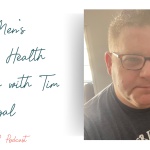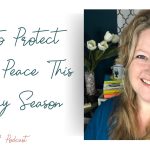When we become aware of why we do what we do, we find the steps to heal and grow. I believe this is why we need to understand trauma — what it is, from both a clinical and humanitarian perspective, and that we all have it, to some degree. That’s why episode 29 of The Positively Living Podcast is about living a trauma informed life.
When you think of trauma, do you think of extreme events like war and violence? They are definitely connected. But what about breakups or humiliating experiences or grief? Would you consider those to be traumatic? They absolutely can be, and I think in extreme cases we will readily categorize them as such, but in general we’re inclined to pass them off as not qualifying for the title. The fact is, 70% of adults have experienced a traumatic event, which means it’s quite likely you have even if it isn’t obvious to you or at the very least, someone you are close to has. My hope is that this episode will give you the perspective to validate your experiences and observations and encouragement to take steps to heal.
[intro]
Trauma is a current imprint of pain we’ve experienced — a physical manifestation of experience coming back as a reaction. That reaction — a Trauma response – can impact every aspect of your life from your relationships to productivity to careers and more. It threads it way through your experiences, forcing you to find coping mechanisms in unexpected ways. For example, did you know that keeping busy can actually be a trauma response? Or the inability to ask for help and the tendency to be ultra independent? There is far more to this concept than you might expect and that is why I welcome Mallory Jackson to the Positively Living Podcast today.
Mallory is a Professor of Human Services and Chemical Dependency Counseling at SUNY Jefferson Community College. She holds Masters Degrees in Public Administration and Counseling. She specializes in trauma-informed care and education within higher education and along with teaching, she coordinates the Human Service and Chemical Dependency internship program at the college.She is married to her husband Pete, a NYS Conservation Officer. She has two sons Logan and Daniel and a geriatric chocolate lab named Jack.
Mallory and I became friends years ago. You probably couldn’t guess how we met but I reveal it in our conversation. When you hear her speak, you will understand how and why we stayed connected and why I chose her to talk about this. Through years of coaching and organizing work, I began to connect grief and trauma to clutter so I knew I wanted to share this topic. I believe we need to understand trauma from both a clinical and humanitarian perspective. And we need to understand that we all have trauma, to some degree, and we are not here to compare or to fix, but rather to become aware of why we do what we do and find the steps to heal and grow.
Today we cover what trauma is, the causes of it, the responses, and the treatments. It’s not a surprise that attacks and accidents were on the cause list, but it was an important reminder for me that ongoing stress, illness, and caregiving were as well. Then there are the less obvious causes like grief, humiliating experiences breakups, sudden losses (which connects to grief) and most recently our experiences in 2020 with COVID 19.
Mallory described so many ways that trauma shows up — not only in more obvious coping like substance abuse and disordered eating, but in fear of success or trouble asking for help.
She and I also geeked out science style on the brain and guess what word makes a cameo again? Neuroplasticity! I first introduced that in Episode 7 in the Impact of Stress, which is another word that makes an appearance repeatedly. We talk about the connection between trauma, shame, grief, rage, and stress, which is intense. But here’s where it gets even better: When we know these connections and these responses, we can make huge shifts. We can use resiliency to change trauma’s effect. We can adapt through simple wellness practices I share here. One of the most powerful? Gratitude. We can use the same brain response we experience from Trauma to create a powerful impact that aids in our resiliency and happiness. Like Grief, which I talk about with Katie Rossler in Episode 14, we can grow through our Trauma.
Mallory suggests a variety of resources if you’re looking to learn more about Trauma. In addition to books by Melody Beattie, Anne Lamott, and Brene Brown, she recommends The Body keeps the Score by Bessel VanDerKolk, Maybe you should talk to someone by Lori Gottleib, and It didn’t start with you by Mark Wolynn (which is about generational trauma)
One of the biggest takeaways from our conversation today is how important support is to our wellbeing and resilience. If you are in need of telehealth connections, please reach out to me and I will find recommendations. I invite you to join the Positively Grateful Series Community — a free group open year round with quarterly coaching and prompts that encourage you to make gratitude a habit. If you want to learn more about it, listen to Episode 4. If you think life coaching would be the right place for you to start, let’s hop on a connection call, which you can book from my website www.positivelyproductive.com or message me directly through the show notes. There are many support systems out there ready to help you thrive. I encourage you to find them.
Thank you for listening! Be sure to tune in to all the episodes to receive tons of practical tips to create space for what really matters in your life
If you enjoyed this episode, take a screenshot of the episode to post in your stories and tag me! And don’t forget to subscribe, rate, and review the podcast and tell me your key takeaways!
MALLORY JACKSON teaches at SUNY Jefferson Community College
CONNECT WITH LISA ZAWROTNY:
LINKS MENTIONED IN THIS EPISODE:
The Body keeps the Score by Bessel VanDerKolk
It didn’t start with you by Mark Wolynn
Maybe you should talk to someone by Lori Gottleib
Authors: Melody Beattie, Anne Lamott, Brene Brown
Episode 4 The Power of Gratitude
Episode 7 The Impact of Stress and How to Manage it for Good
Episode 14 How We Grow through Grief with Katie Rossler
Episode 23 Pay Attention, Find Your Purpose with Michelle Perry
Book a connection call with Lisa
Music by Ian and Jeff Zawrotny












